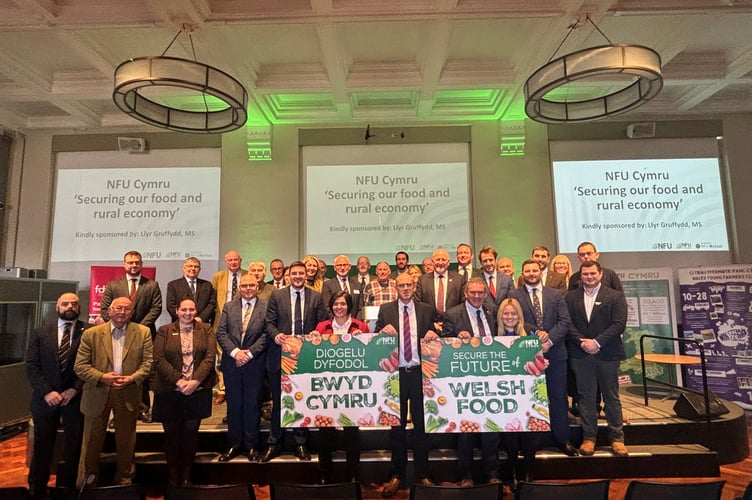AROUND 13,000 people descended on London last week in protest at the UK Government’s inheritance tax plans.
There has been widespread condemnation in the agricultural industry to Chancellor, Rachel Reeves' announcement in the budget that farms worth more than £1 million will face an inheritance tax rate of 20 per cent.
Both NFU Cymru and FUW have said the plan would have ‘disastrous consequences’ on family farms.
Farmers from across Wales headed east to make their voices heard and to protest the plans.
There was also a protest staged in Llandudno during the Labour conference, where Prime Minister Keir Starmer said he defended the budget for taking "tough decisions that were necessary to stabilise our economy".

Mr Starmer did not speak with the protestors in north Wales, with prominent campaigner, Gareth Wyn-Jones accusing the PM of ‘running out the back door like a flipping rat’.
NFU Cymru President Aled Jones said: “For decades APR and BPR have underpinned viable working farming businesses, of all shapes and sizes. NFU Cymru’s fear is that this week’s changes, if they go ahead as planned, will cause lasting damage to Welsh farming, leading to the break-up of family farms – farms that contribute to the nation’s food security, our rural communities, the economy and of course the Welsh language.”
This was the second mass protest staged by Welsh farmers this year following mass gatherings in Aberystwyth, Carmarthen and Welshpool earlier this year over the Welsh Government’s Sustainable Farming Scheme.
Local politicians have given their support to farmers.
Ben Lake MP for Ceredigion Preseli said: “Labour Governments at both ends of the M4 are continuing to overlook the realities of family farming and its vital role in sustaining our rural communities.
“The implications of the UK Government’s Budget pose a serious threat to the future of the family farm model, and if policymakers are truly committed to addressing food security, they must urgently rethink these harmful measures.”
Dwyfor Meirionnydd MP Liz Saville Roberts echoed these sentiments and accused Labour of overlooking the struggles of Welsh farmers at the protest.
Mrs Saville Roberts said: “Welsh farmers are fed up. Labour in both Westminster and Cardiff Bay continue to overlook the struggles of family farms, treating them as an afterthought.
“The recent fiasco over Agricultural Property Relief (APR) is a perfect example – no consultation, no understanding, just decisions made with a broad brush from a distance.

“It isn’t just APR. Labour’s plan to direct Welsh agricultural funding through the Barnett formula rather than through a ring-fenced addition could slash farm funding by 40 per cent.
“These policies reflect a stereotype in Labour’s imagination of farmers as mega-wealthy landowners who buy up land to avoid paying inheritance tax. When it comes to Wales, that isn’t just wrong – it’s insulting.
“Most upland farmers in Wales barely scrape by on £18,600 a year, far below the average salary, while working far beyond the typical 40-hour week.
“The chancellor’s error was not to increase taxes on wealthy landowners who use farmland to dodge taxes – most people wouldn’t have a problem with that.
“Her mistake was failing to distinguish between these individuals and real, hardworking family farms. This failure has resulted in the fiasco where government departments contradict each other on how many farms will be affected.
“Farmers deserve governments that see Welsh farmers for what they are: hardworking, underappreciated, and essential to our rural communities.
“Plaid Cymru will always appreciate the importance of family farms for our rural economy, for food security, and for Wales’ future.”
NFU’s UK President Tom Bradwshaw, said: “You don’t need me to tell you farmers and growers have put up with a hell of a lot, but it takes something extraordinary to get us to react like this and this betrayal on APR and BPR is extraordinary, and it affects farmers from every corner of Britain, many of whom are joining us today.
“I don’t think I’ve ever seen the industry this angry, this disillusioned and this upset. And given what we’ve had to be angry about in recent times that’s saying something.
“Together, our focus today with MPs is on Agricultural Property Relief and Business Property Relief – this shocking policy built on bad data and launched with no consultation with anybody that understands. Not even Defra.
“Let us remember that they promised, nearly a year ago, they wouldn’t be changing Agricultural Property Relief.
“It’s not only been bungled in delivery, it’s also nothing short of a stab in the back.
“But we also know that it’s not just about APR and BPR, but that is the straw which broke the camel’s back.
“After years of changing policy and 18 months of some of the worst weather on record, the Budget has been a kick in the teeth.
“It is full of let-downs for our vital sector; accelerated BPS reductions, double cab pick-up taxes, new taxes on fertilisers.”
FUW is also concerned over what last month’s budget could mean for agricultural funding in Wales.
As part of her Budget, Chancellor, Rachel Reeves redefined agricultural funding for the devolved nations using the Barnett formula, rather than maintaining a separate, ring-faced allocation as has historically been the case.
Previously, EU funding for UK agriculture was allocated across the UK nations under the Common Agricultural Policy (CAP) formula, based on rural and farming criteria such as the size, number and nature of farms. This resulted in 9.4% of the total UK agriculture budget coming to Wales when we were members of the EU.
However, the FUW has warned the UK Treasury’s decision to ‘Barnettise’ the block grant for each devolved nation, a calculation based on population rather than farm and rural characteristics, could see Wales’ proportion of total UK agricultural funding fall drastically.
Writing to the Secretary of State for Wales, FUW President, Ian Rickman, has sought urgent clarity from the UK Government on the funding reform - citing a worse case scenario ‘Barnettisation’ of agricultural funding that could see Wales’ proportion of total UK agricultural funding fall from 9.4% to around 5% - equal to a cut of around 40% in funding.
A special event was held in Cardiff Bay on Wednesday, 20 November, to highlight to members of the Senedd the value of farming and the wider supply chain to the prosperity of Wales.
The ‘Securing our food and rural economy’ event brought together farmers and stakeholders to showcase the synergy between Welsh farming business and firms across the supply chain.
MSs in attendance at the ‘Securing our food and rural economy’ event, kindly sponsored by Llyr Gruffydd MS, were shown a video where contributors each explained the role their business plays in the Welsh supply chain success story. Those featured included Swans Farm Shop, Mold; Welsh potato, vegetable and bottled milk suppliers Puffin Produce, Pembrokeshire; the Royal Welsh Agricultural Society; British Wool; food service wholesalers Castell Howell Foods; processors Dunbia; South Wales Farm Vets; and agricultural merchants and suppliers Wynnstay.
Speaking after the event, NFU Cymru President Aled Jones said: “I am so pleased that we were able to bring together stakeholders and partners from across Wales at today’s event to really encapsulate the knowledge, skills and expertise that exists in our supply chain network. I feel it’s crucial that we show our MSs the importance of these interlinked business and the social-economic boost provided by the products and services they supply.
“As Welsh farmers we are very much the foundation of this supply chain; the raw ingredients we produce and the work we do on farm is complemented and added to by others throughout the supply chain. Farmers spend around £1.5billion annually on products such as feed, fertiliser, veterinary services, farm machinery and contract work. We are incredibly proud to be a part of a Welsh food and drink industry that is worth £9.3 billion to the Welsh economy and employs almost a quarter of a million people.
“As it stands, rural affairs receives around 2% of the Welsh Government budget, but the ripple effect of that funding supports not only food security, but also delivers for the economy, jobs, the environment, communities and culture. That is why we believe it is imperative that Welsh Government continues to support our industry and its multiplier effect. We are grateful that the Deputy First Minister and Cabinet Secretary for Rural Affairs, Huw Irranca-Davies MS, has committed to maintaining the Basic Payment Scheme (BPS) for 2025, we are clear that the BPS budget must be maintained at current levels (£238million) for 2025 to provide much needed stability to farmers and rural Wales.
“Farming businesses also need Welsh Government to provide clarity on a long-term financial framework that provides financial support and stability. Such a commitment will enable Welsh farmers to have the confidence to continue investing in their businesses for the benefit of food, nature, climate and communities.
“NFU Cymru is grateful to all MSs who joined us at the Pierhead for our ‘Securing our food and rural economy’ reception. All those who attended can be in no doubt that it is only right that we herald the extraordinary success of the Welsh supply chain and underline the compelling case to continue support these businesses and their ambitions.”
In response to last week’s protest, the UK Government said: “There has been extensive discussion about the changes to Agricultural Property Relief, announced in the Budget on 30 October.
“The government inherited a £22 billion hole in the public finances, and we had to make difficult decisions at the Budget to fund the public services that farmers and families in rural communities rely on.
“The changes we made are balanced and proportionate and around 500 claims a year are expected to be affected. These figures are based on the latest available information from HMRC on actual claims for Agricultural Property Relief.”
This claim that only 500 farms a year will be affected has been hotly disputed by the industry.
Immediately after the Budget, First Minister Eluned Morgan told plenary in Cardiff Bay it was a "very very small" number and we asked for clarification. The Welsh Government referred us to the Treasury which admitted it does not have regional figures.
The Country Land and Business Association (CLA) said however that the policy could affect 70,000 farms across the United Kingdom.
In a joint statement issued, Chancellor of the Exchequer Rachel Reeves and Secretary of State for Environment, Food and Rural Affairs, Steve Reed said: “Farmers are the backbone of Britain, and we recognise the strength of feeling expressed by farming and rural communities in recent weeks. We are steadfast in our commitment to Britain’s farming industry because food security is national security.
“It's why we are investing £5 billion into farming over the next two years – the largest amount ever directed towards sustainable food production, rural economic growth and nature’s recovery in our country’s history.
“But with public services crumbling and a £22 billion fiscal hole that this Government inherited, we have taken difficult decisions.
“The reforms to Agricultural Property Relief ensure that wealthier estates and the most valuable farms pay their fair share to invest in our schools and health services that farmers and families in rural communities rely on.”
Looking ahead, in a column, the FUW says: “Whilst the changes to the inheritance tax continue to dominate the headlines at Westminster, much of the talk with Labour Senedd Members revolved around the revised Sustainable Farming Scheme (SFS).
“We expect a statement from the Cabinet Secretary on the proposals next week at the Winter Fair.
“Whilst the announcement of the revised scheme outline will merely mark the end of the beginning - it will provide an important insight into the expectations and support that will be put forward for farmers in Wales to produce quality, sustainable food alongside other environmental and public goods.
“The FUW looks forward to engaging with its members once these plans are announced.”




